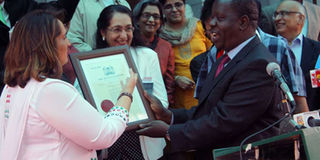Declaration reinforces idea that tribal identity matters

Acting Interior Cabinet Secretary Fred Matiang’i hands members of the Kenyan Asian community a certificate of recognition as the 44th tribe, at Harambee House on July 22, 2017. Dr Matiang’i said it was a sign that Kenyans of Asian descent are “part and parcel of us formally”. PHOTO | ANTHONY OMUYA | NATION MEDIA GROUP
What you need to know:
Kenyan Asians have for far too long been treated as second class citizens, whose loyalty to Kenya has always been questioned.
Asians will no longer be forced to view citizenship as a privilege, but as a right.
It is an act of immense political maturity for a state to recognise that non-indigenous people living within its borders have claims over citizenship and rights.
Kenyan Asians were last week officially recognised as Kenya’s 44th tribe. So why am I not elated?
Well, for one, Kenyan Asians are an extremely diverse group of people who do not all speak the same language or follow the same religion.
They do not fit the dictionary definition of “tribe” – “a social division in a traditional society consisting of families or communities linked by social, economic, religious or blood ties, with a common culture and dialect, typically having a recognised leader”.
I do appreciate, however, that the government has finally acknowledged that the Asian community deserves to be treated as part and parcel of Kenya.
Kenyan Asians have for far too long been treated as second class citizens, whose loyalty to Kenya has always been questioned.
VILIFIED
They have been denied civil service jobs and vilified by politicians, despite the fact that many of them participated in the country’s independence struggle.
Official recognition promises to mainstream Asians with the rest of Kenyans. Asians will no longer be forced to view citizenship as a privilege, but as a right.
Contrary to popular belief, Indian settlement in Kenya did not begin during the building of the Uganda Railway from Mombasa to Kisumu at the beginning of the 20th century.
People from the Indian subcontinent have lived on the East African coast for centuries.
The pilot that showed the Portuguese explorer Vasco da Gama the sea route to India was an Indian from Malindi. Indian presence along the East African coast in the 18th and 19th centuries is evident even today in the architecture of the old historical buildings in places such as Zanzibar and Mombasa.
TRADERS
Before and after independence, Asians played an important role in the economy – as small-scale traders, industrialists and professionals.
Their contribution to the growth and development of urban centres across Kenya cannot also be underestimated.
This community, which has no other place to call home, should, therefore, be recognised as an integral part of this country.
It is also an act of immense political maturity for a state to recognise that non-indigenous people living within its borders have claims over citizenship and rights.
Many countries in the Arab world, for instance, do not accord such rights to those they deem to be “foreign”.
RACIAL EXCLUSION
The recognition of Asians as a Kenyan “tribe” is akin to Nelson Mandela’s declaration of South Africa as a “Rainbow Nation” of black, brown, white and mixed-race people.
Mandela rejected the unjust politics of racial exclusion, which he knew would ultimately have a negative impact on national cohesion and the economy.
However, what makes me uneasy about the designation of Kenyan Asians as a Kenyan “tribe” is that it reinforces the idea that one must belong to a tribe to be recognised as a bona fide citizen.
The message it sends to Kenyans is that tribe or ethnicity is an important – if not the most important – part of their identity.
I have many identities, as do most people. I am a woman. I am a wife. I am a sister and an aunt.
I speak three Indian languages and one African language, but I am most fluent in English.
I am a writer and an experienced editor. I also happen to be a Kenyan of Indian origin. Which of these identities matter to me the most on a day-to-day basis depends on where I am, who I am with, and what the conversation is about.
TRIBAL IDENTITY
The problem with emphasising tribal identity in a country like Kenya is that it is used to oppress or marginalise those who do not belong to the bigger, more dominant tribes; the numerical strength of your tribe determines your access to opportunities.
Tribe is destiny.
Recent data from the National Cohesion and Integration Commission shows that three-quarters of all public service jobs in Kenya are held by members of the five largest tribes – the Kikuyu, the Kalenjin, the Luhya, the Luo and the Kamba. In the tribal numbers game, my “tribe” – the 50,000 or so Kenyan Asians – will always lose.
Kenyans from all of Kenya’s smaller tribes suffer the same fate. Just ask the Rendille or the El Molo. I do not think that being officially recognised as a tribe has made a dent on their political or economic fortunes. On the contrary, their tribal identity has mostly worked against them.




